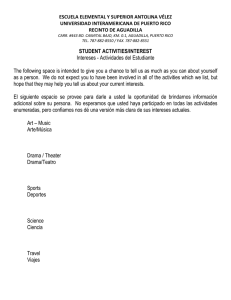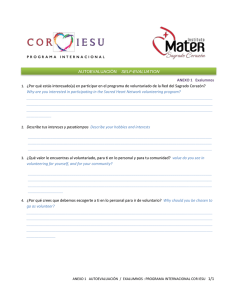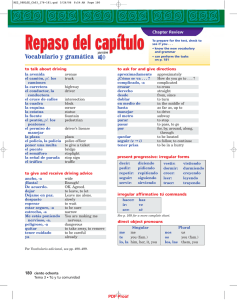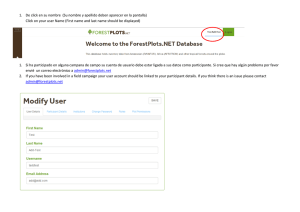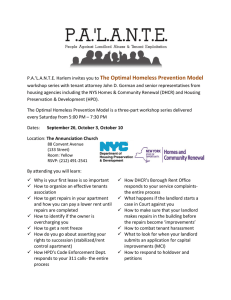Orange County Declaration of Tenants Rights and Obligations
Anuncio
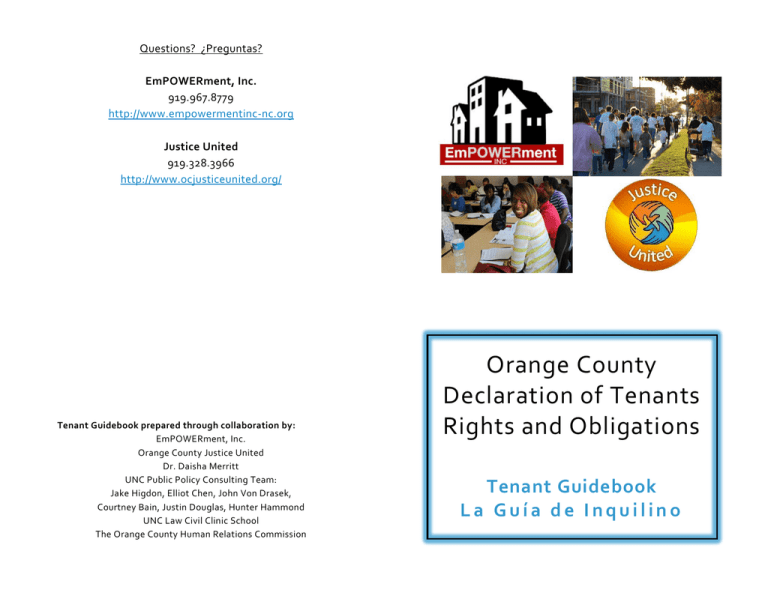
Questions? ¿Preguntas? Justice United 919.328.3966 http://www.ocjusticeunited.org/ Tenant Guidebook prepared through collaboration by: EmPOWERment, Inc. Orange County Justice United Dr. Daisha Merritt UNC Public Policy Consulting Team: Jake Higdon, Elliot Chen, John Von Drasek, Courtney Bain, Justin Douglas, Hunter Hammond UNC Law Civil Clinic School The Orange County Human Relations Commission Lorem & Ipsum [Street Address] [City], [State][Postal Code] EmPOWERment, Inc. 919.967.8779 http://www.empowermentinc-nc.org Orange County Declaration of Tenants Rights and Obligations Tenant Guidebook La Guía de Inquilino 2 23 TENANT GUIDEBOOK LISTA DE RECURSOS 2016 TABLE OF CONTENTS • OVERVIEW Page 4 • TENANT RIGHTS Lease……………………………………………………………..6 Security Deposit……………………………………………….6 Decent, Safe, and Habitable Housing…………………….8 Late Fees………………………………………………………..8 Quiet Enjoyment…………………………………….…….…10 Discrimination………………………………………………..10 Domestic Violence Victim Protection……………..…….10 Eviction…………………………………………………………12 Public Housing…………………………………………………………14 TENANT RESPONSIBILITIES Pay Rent……………………………………………………….16 Self-Help or Rent Abatement……………………………..16 Maintain the Premises………………………………………18 Repairs………………………………………………………….18 End of Lease…………………………………………………..18 Complaints…………………………………………………….20 RESOURCE LIST Page 22 • • • • • • Legal Resources NC Legal Aid: 919-542-0475 – www.legalaidnc.org – provides legal advice; representation for residents of Orange and Chatham County; forms are available online for small claims court UNC Civil Legal Assistance Clinic: 919-962-2888 – www.law.unc.edu/academics/clinic – part of UNC Law School – provides legal advice and representation Inspection Agencies Carrboro Inspection Department: 919-918-7336 – http://www.ci.carrboro.nc.us/133/Planning-Zoning-Inspections – Planning Dept. will inspect for safe housing Chapel Hill Inspection Department: 919-968-2718 – http://www.townofchapelhill.org/town-hall/departmentsservices/planning-and-sustainability/permits-and-inspections – will inspect for safe housing (i.e. bug infestation) Orange County Inspection Department: 919-245-2600– www.orangecountync.gov/planning OWASA: 919-537-4343– www.owasa.org – water authority in Chapel Hill/Carrboro; checks on leaks or reason for high water bill Local Government Orange County Housing, Human Relations and Community Development Department: 919-245-2487 – http://www.orangecountync.gov/departments/hhrcd/index.php – fair housing advice and representation Organizing Orange County Justice United: 919-225-2986 or 919-358-5828 – www.ocjusticeunited.org – works in the community for justice and the common good *Preparado por la Escuela de Leyes de la Universidad de Carolina del Norte Clínica de Asistencia Legal Civil, Orange County Justice United, EmPOWERment Inc., y Orange County Human Relations Commission FIND MORE ONLINE AT EMPOWERMENTINC-NC.ORG Tenant Guidebook 2016 22 RESOURCE LIST 3 LA GUÍA DE INQUILINO 2016 Legal Resources NC Legal Aid: 919-542-0475 – www.legalaidnc.org – provides legal advice; representation for residents of Orange and Chatham County; forms are available online for small claims court UNC Civil Legal Assistance Clinic: 919-962-2888 – www.law.unc.edu/academics/clinic – part of UNC Law School – provides legal advice and representation • • • • • • • • Inspection Agencies Carrboro Inspection Department: 919-918-7336 – http://www.ci.carrboro.nc.us/133/Planning-Zoning-Inspections – Planning Dept. will inspect for safe housing Chapel Hill Inspection Department: 919-968-2718 – http://www.townofchapelhill.org/town-hall/departmentsservices/planning-and-sustainability/permits-and-inspections – will inspect for safe housing (i.e. bug infestation) Orange County Inspection Department: 919-245-2600– www.orangecountync.gov/planning OWASA: 919-537-4343– www.owasa.org – water authority in Chapel Hill/Carrboro; checks on leaks or reason for high water bill Local Government Orange County Housing, Human Rights and Community Development: 919-245-2487 – http://www.orangecountync.gov/departments/hhrcd/index.php – fair housing advice and information Organizing Orange County Justice United: 919-225-2986 or 919-358-5828 – www.ocjusticeunited.org – works in the community for justice and the common good * Prepared by the University of North Carolina School of Law Civil Legal Assistance Clinic, Orange County Justice United, EmPOWERment Inc. and Orange County Housing, Human Rights and Community Development TABLA DE CONTENIDO RESUMEN Pagina 5 DERECHOS DE LOS INQUILINOS Arrendamiento…….…………………………………………....7 Depósito de Garantía……..…………………………………….7 Vivienda Decente, Segura y Habitable……….…………….9 Cargos por Retraso.……………………………………………..9 Disfrute del Silencio…..……………………………..………..11 Discriminación ……..…………………………………..………11 Protección para las Víctimas de Violencia Doméstica...11 Desalojo ..……………………………………………………….13 Vivienda Pública……….………………………………………15 OBLIGACIONES DEL INQUILINO Pagar Alquiler.……………………………………………….…17 No Puede Ejercer Ayuda Propia ni Reducir el Alquiler sin una Orden de la Corte ………………………………...………17 Mantener el Local …………………………………………..…17 Notifique al Propietario por Escrito de las Reparaciones Necesarias ………………………………………………………19 Desocupe el Local Cuando se Venza el Contrato………..19 Quejas…………………………………………………………….21 LISTA DE RECURSOS Pagina 23 FIND MORE ONLINE AT EMPOWERMENTINC-NC.ORG Tenant Guidebook 2016 4 21 OVERVIEW As a tenant you have certain rights and obligations under North Carolina law. See N.C. Gen. Stat. § 42-41. At its heart, North Carolina landlord-tenant law entitles you to safe, decent, and sanitary housing. It also requires you to pay rent and to maintain the premises that you are renting. QUEJAS Si usted tiene una queja o cree que sus derechos han sido violados, siempre por escrito y conservar una copia para sus registros. Mostrar las fechas y horas en su caso. Si su queja o preocupación no está en una ley estatal o que no estén específicamente dirigidas a esta Declaración, que puede ser subsanado por solicitar el asesoramiento de los organismos en la lista de recursos (pagina 23). The purpose of this Declaration of Tenants Rights and Obligations is to help you understand the scope of your rights and obligations. This listing of tenant rights and obligations is not exhaustive and should not be used as a substitute for legal advice in the event a dispute arises between you and your landlord. Rather, it functions as a basic overview of your rights and obligations as a tenant in Orange County, North Carolina. Knowledge of your rights is the first step in being able to exercise and enforce them. For legal resources, see Resource List (page 22). Tenant Guidebook 2016 20 5 COMPLAINTS If you have a complaint or believe your rights have been violated, always put it in written form (letter or email) and keep a copy for your records. Show dates and times where applicable. If your complaint or concern is not in a state statute or not specifically addressed in this Declaration, it may be remedied by seeking advice from agencies on the Resource List (page 22). RESUMEN Como inquilino, usted tiene ciertos derechos y obligaciones bajo la ley de Carolina del Norte. Consulte N.C. Gen. Stat. § 42-41 (2012). La ley del propietario e inquilino de Carolina del Norte le otorga el derecho a una vivienda segura, decente e higiénica. También requiere que usted pague alquiler y que cuide la propiedad que usted está alquilando. El propósito de la Carta de Derechos y Obligaciones de los Inquilinos es el de ayudarle a entender la amplitud de sus derechos y obligaciones. Este listado de derechos y obligaciones de los inquilinos no es total y no debería ser utilizada en vez de un consejo legal en el caso de que surja una disputa entre usted y el propietario. Más bien, funciona como un resumen básico de sus derechos y obligaciones como inquilino del Condado Orange de Carolina del Norte. El conocimiento de sus derechos es el primer paso para poder ser capaz de ejercerlos y hacerlos cumplir. Ver Lista de recursos en la última página 23. Tenant Guidebook 2016 6 19 2016 OBLIGACIONES DEL INQUILINO TENANT RIGHTS 2016 LEASE A written lease is not required to establish a landlord tenant relationship under North Carolina law. See N.C. Gen. Stat. § 42-3. The laws and protections that apply to tenants may apply to you even if you have an oral agreement with your landlord rather than a written lease. However, if you do have a written lease, the landlord must give you a full copy of the lease and provide you with time to review it before you sign it. SECURITY DEPOSIT Amount of your security deposit - The landlord can require you to pay a security deposit. The amount of the security deposit cannot exceed: (i) two weeks’ rent if you are paying rent on a weekly basis; (ii) one and a half months’ rent if you pay rent on a monthly basis and (iii) two months’ rent if you pay rent for longer than a month (e.g., you pay rent every two months or longer). See N.C. Gen. Stat. § 42-51. NOTIFIQUE AL PROPIETARIO POR ESCRITO DE LAS REPARACIONES NECESARIAS Usted tiene que notificarle a su propietario por escrito de cualquier reparación o reemplazo que se necesite hacer a los sistemas eléctricos, de plomería, de higiene, de calefacción, ventilación, sistema de aire acondicionado, alarmas de humo o de monóxido de carbono Consulte $$ DESOCUPE EL LOCAL CUANDO SE VENZA EL CONTRATO Usted tiene que desocupar el local cuando se expire el periodo de tiempo del contrato de arrendamiento. Consulte N.C. Gen. Stat. § 42-26. Location of your security deposit - The landlord must place your security deposit into a trust account with a licensed and insured North Carolina bank or savings institution. The landlord must inform you where your security deposit is being held within thirty (30) days of the beginning of your lease term. See N.C. Gen. Stat. § 42-50. Return of the security deposit - When you move out, the landlord must return your security deposit to you within thirty (30) days, unless the landlord provides proof that the deposit is being used for a proper purpose such as: (i) repairing damages made to the unit other than reasonable wear and tear; (ii) rent that you owed but did not pay; (iii) any court costs the landlord had to pay if you were evicted and (iv) the cost of finding a new tenant if you left your apartment before the end of the lease. See N.C. Gen. Stat. § 42-52. Finally, if the landlord fails to return your security deposit or to explain why any portion of your security deposit is not being returned, you may bring a claim against the landlord in small claims court to recover your security deposit. See N.C. Gen. Stat. § 42-55 and see Resource List (page 22). Tenant Guidebook 2016 18 7 TENANT2016 OBLIGATIONS DERECHOS DE LOS INQUILINOS 2016 ARRENDAMIENTO NOTIFY LANDLORD IN WRITING OF NEED FOR REPAIRS Un acuerdo de arrendamiento por escrito no es necesario para establecer una relación entre el propietario y el inquilino bajo la ley de Carolina del Norte. Las leyes y protecciones que cubren a los inquilinos pueden cubrirle a usted aunque usted tenga solamente un acuerdo verbal y no un acuerdo por escrito. Sin embargo, si usted tiene un acuerdo por escrito, el propietario tiene que proveerle una copia completa del acuerdo, además de proveerle suficiente tiempo para repasarlo antes de firmarlo. You must notify the landlord in writing of any repairs or replacements that need to be made to the electrical, plumbing, sanitary, heating, ventilating, air conditioning system, smoke or carbon monoxide alarms. See N.C. Gen. Stat. § 42-43(7). $$ VACATE THE PREMISES WHEN LEASE IS OVER You must vacate the premises upon the expiration of your lease term. See N.C. Gen. Stat. § 42-26. DEPÓSITO DE GARANTÍA La cantidad de su depósito de garantía - El propietario puede exigirle que usted pague un depósito de garantía. La cantidad del depósito de garantía no puede exceder: (i) dos semanas de alquiler si usted está pagando alquiler semanalmente; (ii) un mes y medio de alquiler si usted paga alquiler mensualmente y (iii) dos meses de alquiler si usted paga alquiler por más de un mes (ej., usted paga alquiler cada dos meses o más). Consulte N.C. Gen. Stat. § 42-51 (2012). Ubicación de su seguro de - El propietario tiene que ingresar su depósito de garantía en una cuenta de fideicomiso en un banco autorizado y asegurado de Carolina del Norte o en una institución de ahorro. El propietario tiene que informarle a usted donde se encuentra su depósito antes de que pasen 30 días después de recibir su depósito de garantía. Consulte N.C. Gen. Stat. § 42-50 (2012). Devolución del depósito de garantía - Cuando usted se muda, el propietario tiene que devolverle su depósito de garantía dentro de los próximos treinta (30) días, a menos que su propietario le presente evidencia de que el depósito será utilizado para un propósito apropiado tales como: (i) reparaciones de daños a la propiedad que no fueron causados por desgaste y deterioro a causa de uso razonable; (ii) alquiler que se debía pero no se pagó; (iii) cualquier gasto de corte que el propietario tuvo que pagar si usted fue desalojado y (iv) el costo de encontrar un nuevo inquilino si usted se fue de su apartamento antes del final del contrato. Finalmente, si el propietario no le devuelve su depósito de garantía o no le explica la razón por la cual una porción de su depósito de garantía no se le devolvió, usted puede reclamar en contra del propietario en un tribunal de reclamos menores para recuperar su depósito de garantía. Consulte N.C. Gen. Stat. § 42-55 (2012) y ver Lista de recursos en la página 23. Tenant Guidebook 2016 8 17 OBLIGACIONES DEL INQUILINO TENANT RIGHTS DECENT, SAFE, AND HABITABLE HOUSING Tenant Rights - You have the right to decent, safe and sanitary housing in which the plumbing, electrical wiring, heating/cooling systems and smoke detectors work properly. See N.C. Gen. Stat. §§ 42-42(a)(4)–(5). You also have the right to housing in which the common areas that are used by all tenants such as the stairs, hallways and sidewalks are in a safe condition. See N.C. Gen. Stat. § 42-42(a)(3) and see Resource List (page 22). Landlord’s Obligation - Your landlord is required to make any and all repairs necessary to ensure that your housing unit and the common areas are safe and fit. See N.C. Gen. Stat. § 42-42(a)(2)(3). Your landlord is also required to ensure that your housing unit complies with the local building and housing codes. See N.C. Gen. Stat. N.C.G.S. § 42-42(a)(1) and see Resource List (page 22). If you believe that your rental unit is not safe or habitable and may violate the local building or housing code, you have the right to have the property inspected for free by a local Housing Inspector or Code Enforcement Official. See Resource List (page 22). $$ PAGAR ALQUILER A usted se le prohíbe ejercer ayuda propia reteniendo el pago de alquiler sin una orden de la corte. Si su propietario no hace reparaciones o no sigue las condiciones del contrato de arrendamiento, usted tiene que ir a corte para pedir ayuda y no puede dejar de pagar ninguna porción del alquiler sin primero obtener la aprobación de la corte. Consulte N.C. Gen. Stat. § 42-43 (a) (1)-(6). NO PUEDE EJERCER AYUDA PROPIA NI REDUCIR EL ALQUILER SIN UNA ORDEN DE LA CORTE A usted se le prohíbe ejercer ayuda propia reteniendo el pago de alquiler sin una orden de la corte. Si su propietario no hace reparaciones o no sigue las condiciones del contrato de arrendamiento, usted tiene que ir a corte para pedir ayuda y no puede dejar de pagar ninguna porción del alquiler sin primero obtener la aprobación de la corte. Consulte N.C. Gen. Stat. § 42-43 (a) (1)-(6). LATE FEES Your landlord may charge you a late fee if your rent is late by five (5) days or more. See N.C. Gen. Stat. § 42-46(a). If your rent is due in monthly installments, the late fee may not exceed fifteen ($15.00) dollars or five (5%) percent of the monthly rent, whichever is greater. See N.C. Gen. Stat. 42-46(a)(1). If the rent is due in weekly installments, the landlord may charge a late fee not exceeding four dollars ($4.00) or five (5%) percent, whichever is greater. See N.C. Gen. Stat. 42-46(a)(2). Late fees can only be charged one time for each late rental payment and cannot be deducted from your next month’s rent payment. See N.C. Gen. Stat. 42-46(b). Tenant Guidebook MANTENER EL LOCAL Usted debe mantener el local seguro y limpio. Usted no puede intencionalmente hacerle daño o permitir de que sus invitados le hagan daño al local. Usted debe botar toda la basura de una forma segura e higiénica. Consulte N.C. Gen. Stat. § 42-43 (a) (1)-(6). 2016 9 16 TENANT OBLIGATIONS $$ PAY RENT DERECHOS DE LOS INQUILINOS VIVIENDA DECENTE, SEGURA Y HABITABLE You must pay rent on time and in accordance with the lease terms. See N.C. Gen. Stat. § 42-3. If you fail to pay rent within ten (10) days of your landlord clearly and unequivocally demanding rent, the landlord may begin eviction proceedings against you. Derechos de los Inquilinos – Usted tiene el derecho de tener una vivienda decente, segura e higiénica en la cual los sistemas de plomería, cables eléctricos, calefacción, aire acondicionado y detectores de humo funcionen apropiadamente. Consulte N.C. Gen. Stat. §§ 42-42(a)(4)-(5) (2012). Usted también tiene el derecho a una vivienda en la cual las áreas comunes que se utilizan por todos los inquilinos, tales como las escaleras, los pasillos y las aceras se encuentren en condiciones seguras. Consulte N.C. Gen. Stat. § 4242(a) (3) (2012). Ver Lista de recursos en la página 23. NO EXCERCISING SELF-HELP OR RENT ABATEMENT WITHOUT COURT ORDER Obligaciones de los Propietarios – Su propietario tiene que hacer todas las reparaciones necesarias para asegurar que su unidad de vivienda y las áreas comunes estén seguras y en buen estado. Consulte N.C. Gen. Stat. § 42-42(a) (3) (2012). Su propietario también está obligado a asegurarse de que su vivienda cumpla con los requisitos de los códigos locales de construcción y de vivienda. Consulte N.C. Gen. Stat. N.C.G.S. § 42-42(a)(1) (2012). Si usted cree que su unidad de alquiler no es segura o habitable y que probablemente viole el código local de construcción, usted tiene el derecho a que le inspeccionen la propiedad sin costo alguno por un Inspector de Viviendas local o por un Oficial de Cumplimiento de Códigos y ver Lista de recursos en la página 23. You are prohibited from exercising self-help, in the form of withholding rent or otherwise, absent a court order. If your landlord won’t make repairs or is otherwise not abiding by the terms of the lease agreement, you must go to the court for help and cannot stop paying any portion of the rent without first obtaining approval from the court. See N.C. Gen. Stat. § 42-25.6 and see Resource List. MAINTAIN THE PREMISES You must keep the premises safe and clean. You must not intentionally damage or allow your guests to damage the premises. You must dispose of all garbage in a safe and sanitary manner. See N.C. Gen. Stat. § 42-43(a)(1)–(6). Tenant Guidebook CARGOS POR RETRASO Su propietario puede cobrarle un cargo por retraso si su pago de alquiler está tarde cinco (5) días o más. Consulte N.C. Gen. Stat. § 42-46(a). Sin embargo, si su alquiler se vence a plazos mensuales, el cargo por retraso no puede exceder quince ($15.00) dólares o cinco (5%) por ciento del alquiler mensual, la cantidad que sea mayor. Consulte N.C. Gen. Stat. 42-46(a)(1). Si el alquiler se vence semanalmente, el propietario puede imponer un cargo que no exceda cuatro ($4.00) dólares o cinco (5%) por ciento, la cantidad que sea mayor. Consulte N.C. Gen. Stat. 42-46(a)(2). Los cargos de retraso solamente pueden ser impuestos una sola vez por cada pago mensual con retraso y no pueden ser descontado de su pago de alquiler del próximo mes. Consulte N.C. Gen. Stat. 42-46(b). 2016 10 2016 TENANT RIGHTS QUIET ENJOYMENT You have the right to peaceful, safe and quiet enjoyment of your home. See N.C. Gen. Stat § 42-59.1. Essentially, this means that the landlord may make any necessary repairs, but the landlord may not unreasonably interfere with your “quiet enjoyment” of your home and must leave you alone while you are living in your rental unit. DISCRIMINATION The landlord may not discriminate against you as a tenant or prospective tenant because of your race, color, national origin, religion, sex, familial status or disability. See Fair Housing Act, § 804; 42 U.S.C. 3604. Discriminatory acts include refusing to rent to you; renting to you on unfavorable terms, conditions, or privileges; creating a hostile living environment; or refusing to make reasonable accommodations to give you an equal opportunity to use and enjoy the premises. See Resource List (page 22). DOMESTIC VIOLENCE VICTIM PROTECTION A landlord cannot terminate, refuse to renew, or refuse to rent to you because you are a victim of domestic violence, sexual assault, or stalking. See N.C. Gen. Stat. § 42-42.2. In addition, you have the right to request that the landlord change your locks to prevent access by an alleged perpetrator of domestic violence. See N.C. Gen. Stat. § 4242.3. 2016 15 DERECHOS DE LOS INQUILINOS VIVIENDA PÚBLICA Si usted reside en una vivienda pública o su alquiler es completamente o en parte pagado por el gobierno federal (ejemplo, usted tiene un cupón del Plan de Sección 8), usted tiene derechos adicionales bajo la ley. Abajo se explica los derechos importantes que usted debe saber si usted vive en una vivienda pública o si recibe un subsidio federal o un cupón para ayudarle a pagar su alquiler. Vivienda Pública – Si usted reside en una vivienda pública, su contrato solo puede ser finalizado por violaciones serias y repetidas del contrato o por otra “buena causa”. Consulte 42 U.S.C. § 1437d (1)(5) (2012). En algunos casos, usted tendría el derecho de solicitar una audiencia de queja antes de que su contrato sea finalizado donde usted tendrá la oportunidad de escuchar las razones por las cuales su contrato de arrendamiento está siendo finalizado y para poder presentar su argumento para explicar la razón por la cual su contrato no debe ser finalizado. Consulte 24 C.F.R. §§ 966.50, 966.52(a), 966.53 (2012). Subsidio Federal de Alquiler (ej. Cupón de la Sección 8) – Si su alquiler es subsidiado completamente o en parte por el gobierno federal (ej., usted recibe un cupón de la Sección 8), su subsidio o cupón puede ser finalizado solamente después de que se le haya dado un aviso y una audiencia. Consulte 24 C.F.R. § 982.555(c) (2) (2012). Durante la audiencia, usted tendrá la oportunidad de presentar la evidencia de porque su subsidio no debe ser finalizado. Para aprender más acerca de sus derechos, si usted reside en una vivienda pública o recibe subsidio federal o cupón, por favor consulte el folleto de los derechos y responsabilidades del residente del Departamento de Vivienda y Desarrollo Urbano (“HUD”) que está disponible en: http://portal.hud.gov/hudportal/documents/huddoc?id=DOC_121 62.pdf Tenant Guidebook 2016 14 2016 2016 TENANT RIGHTS PUBLIC HOUSING DERECHOS DE LOS INQUILINOS Federal Rent Subsidy (e.g., Section 8 Voucher) – If your rent is subsidized in whole or part by the federal government (e.g., you receive a Section 8 voucher), your subsidy or voucher can only be terminated after you have been given notice and a hearing. See 24 C.F.R. § 982.555(c)(2). During the hearing, you have the opportunity to present evidence as to why your subsidy should not be terminated. To learn more about your rights if you live in public housing or receive a federal subsidy or voucher, please see the Housing and Urban Development (“HUD”) resident rights and responsibilities brochure, available online: http://portal.hud.gov/hudportal/documents/huddoc?id=DOC_121 62.pdf Tenant Guidebook DISFRUTE DEL SILENCIO Usted tiene el derecho de disfrutar de un hogar pacífico, seguro y silencioso. Consulte N.C. Gen. Stat. § 42-59.1 (2012). Esencialmente, esto significa que el propietario puede hacer las reparaciones necesarias, pero el propietario no puede interferir de una manera irrazonable con el disfrute del silencio de su hogar y debe de dejarlo a usted tranquilo cuando usted esté viviendo en su unidad de alquiler. If you live in public housing or your rent is subsidized in whole or part by the federal government (e.g., you have a Section 8 voucher), you have additional rights under the law. Public Housing - If you live in public housing, your lease can only be terminated for serious and repeated violations of the lease or for other “good cause.” See 42 U.S.C. § 1437d(l)(5). In some cases, you may also be entitled to request a grievance hearing prior to your lease being terminated where you have the opportunity to hear about the reasons why your lease is being terminated and to present an argument as to why your lease should not be terminated. See 24 C.F.R.§§ 966.50, 966.52(a), 966.53. 11 DISCRIMINACIÓN El propietario no puede discriminar en contra de usted como inquilino o probable inquilino por su raza, color, nacionalidad, religión, sexo, estatus familiar o por discapacidad. Consulte el Acta de la Vivienda Justa, § 804; 42 U.S.C. 3604. Los actos de discriminación incluyen rechazo a alquiler; alquilarle a usted con condiciones o privilegios no favorables, crear un ambiente de vida hostil; o rehusarse a hacer ajustes razonables para darle a usted una misma oportunidad de poder disfrutar y utilizar la propiedad. (Ver Lista de recursos en la página 23). PROTECCIÓN PARA LAS VÍCTIMAS DE VIOLENCIA DOMÉSTICA Un propietario no puede finalizar, rehusarse a renovar o rehusarse a alquilarle a usted porque usted sea una víctima de violencia doméstica, de agresión sexual o de acecho. Consulte N.C. Gen. Stat. § 42-42.2 (2012). Además, usted tiene el derecho de pedir al propietario que le cambie las cerraduras para prevenir acceso al presunto autor de la violencia doméstica. Consulte N.C. Gen. Stat. § 42-42.3 (2012). 2016 12 13 TENANT RIGHTS EVICTION DERECHOS DE LOS INQUILINOS DESALOJO Eviction Process and Notice - You can only be evicted after a summary ejectment proceeding before the court. See N.C. Gen. Stat. § 42-25.6. Further, the landlord is required to provide written notice of the reason you are being evicted. Proceso y Aviso de Desalojo – A usted solamente lo pueden desalojar después del resumen del proceso de desalojo ante la corte. Además, el propietario tiene que proveerle a usted con un aviso por escrito la razón por la cual a usted lo están desalojando. Consulte N.C. Gen. Stat. § 42-25.6 (2012). Grounds for Eviction ● Failure to pay rent - If your landlord is attempting to evict you because you failed to pay rent, the landlord has to request that you pay the rent and must wait ten (10) days before filing a complaint against you with the court to have you evicted. See N.C. Gen. Stat. § 42-3. ● Remaining in premises after lease ends - If you remain in your housing unit after your written lease ends, or after your landlord tells you to leave if you do not have a written lease, the landlord must give you proper notice that you are required to move out. See N.C. Gen. Stat. § 42-14. The landlord must give you at least two (2) days notice if you pay rent on a weekly basis; seven (7) days notice if you pay rent on a monthly basis; one (1) month notice if you have a yearly lease; and sixty (60) days notice if you are renting space for a mobile home. See N.C. Gen. Stat. § 4214. ● Breach of Lease - Your landlord can evict you for violating the terms of the lease but only if there is a written lease agreement and there is a clause in the lease agreement that allows the landlord to end the lease if you violate the terms of the lease agreement. See N.C. Gen. Stat. § 42-26. ● Retaliatory Eviction - Finally, your landlord cannot evict you for complaining about the poor conditions in your housing unit, requesting repairs, joining a tenant organization or trying to enforce your rights under the terms of your lease. See N.C. Gen. Stat. § 42-37.1. Razones para ser Desalojado • Por no Pagar el Alquiler – Si su propietario está tratando de desalojarlo porque usted no pagó el alquiler, el propietario tiene que pedirle a usted que pague el alquiler y tiene que esperar diez (10) días antes de llenar una querella en contra suya con la corte para ser desalojado. Consulte N.C. Gen. Stat. § 42-3. • Por Quedarse en la propiedad después de que se acabe el contrato – Si usted se queda en su unidad de vivienda después de que el contrato por escrito haya terminado o después de que su propietario le diga que usted se tiene que ir si usted no tiene un contrato por escrito, el propietario tiene que darle un aviso apropiado de que usted tiene que irse de la vivienda. Consulte N.C. Gen. Stat. § 42-14. El propietario tiene que darle a usted por lo menos dos (2) días de aviso si usted paga alquiler semanalmente; siete (7) días de aviso si usted paga alquiler mensualmente; un (1) mes de aviso si usted tiene un contrato anual; y sesenta (60) días de aviso si usted alquila espacio para una casa móvil. Consulte N.C. Gen. Stat. § 42-14. • Por Romper el Contrato – El propietario puede desalojarlo a usted por violar las condiciones del contrato pero solamente si hay un contrato acordado por escrito y hay una clausula en el contrato de arrendamiento que permita que el propietario pueda terminar el contrato de arrendamiento si usted violara • Desalojo por Represalia –Finalmente, el propietario no puede desalojarlo a usted por tener quejas sobre las malas condiciones en las que se encuentra su unidad de alquiler, por pedir reparaciones, por unirse a una organización de arrendadores o por tratar de hacer sus derechos valer bajo las condiciones de su contrato. Consulte N.C. Gen. Stat. § 4237.1. Contesting Eviction - You have the right to contest the eviction in front of a magistrate judge. See N.C. Gen. Stat. § 42-31. In such cases, the landlord must prove that you should be evicted by a preponderance of the evidence. See N.C. Gen. Stat. § 42-30. and see Resource List (page 22). Tenant Guidebook Disputando el Desalojo – Usted tiene el derecho de disputar el desalojo ante un juez de magistrado. Consulte N.C. Gen. Stat. § 42-31 (2012). Y en ciertos casos el propietario tiene que tener evidencia de que usted debe ser desalojado por una preponderancia de la evidencia. Consulte N.C. Gen. Stat. § 42-30 (2012). (Ver Lista de recursos en la página 23.) • 2016

